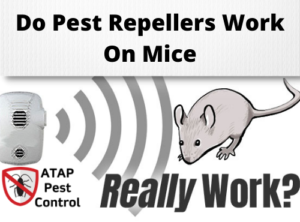ATAP Exterminators are the best company that does mouse exterminators in Chicago with pest repellers. Call at.
In many circumstances, do-it-yourself pest management comes with some dangers and disadvantages—and you may end up spending more money in the long run attempting to handle a big problem on your own.
Many households turn to do-it-yourself bug repellents to save money. Additionally, ultrasonic insect devices and plugins make a vast, audacious promise: simple pest elimination at the touch of a button.
However, these assurances are essentially empty. Indeed, Consumer Reports urges consumers to avoid ultrasonic insect repellents entirely, noting that the New York Attorney General’s Office issued cease and desist letters to two separate producers of these devices in 2016 owing to fraudulent advertising claims. Additionally, the Federal Trade Commission has warned consumers about ultrasonic pest control equipment for decades, citing a lack of scientific data to support manufacturers’ efficacy claims.

Before you purchase a sometimes prohibitively expensive ultrasonic pest control gadget, educate yourself on the different advantages and disadvantages of electronic “plug pest management.” Let’s delve deeper into the topic of ultrasonic insect repellers before discussing some non-aggressive approaches to pest management.
What is a Pest Repellent With Ultrasonic Technology?
An ultrasonic pest repeller is a type of electronic pest management equipment that generates a high-pitched sound at a frequency that may annoy, kill, repel, or incapacitate household pests. Ultrasonic pest control solutions promote themselves as being more convenient and safe than traditional pest repellents and pest control methods.
Typically, the devices are hooked into an electrical outlet. On the other hand, specific devices are battery-operated for easier use in fields, gardens, sheds, and other areas that are not wired for power.
When the machine is turned on, it creates high-pitched sounds or high-frequency vibrations that are usually unnoticeable to human ears. However specific individuals with more sensitive hearing may hear them. Does pest repellers work on mice?
What Types of Bugs Are Ultrasonic Pest Repellers Effective Against?
The majority of ultrasonic pest repellers promise to repel a range of unwelcome household and garden visitors, including the following:
- Cockroaches
- Mosquitoes
- Bugs in the bed
- Flies
- Ticks and fleas (you can even find pet collars with battery-operated ultrasonic devices embedded in them)
- Silverfish
- Birds
- Mice and rats
- The assertion made in support of ultrasonic pest repellents
According to the manufacturers of ultrasonic pest control systems, many pest species dislike the noises and vibrations produced by the machines. Rather than put up with the device’s irritating noises, pests may escape your home and garden, seeking sanctuary in regions not covered by the device’s high-frequency sounds.
A related class of pest management machines, dubbed “subsonic pest repellers,” operates similarly and use extremely low-frequency sounds or vibrations. The claim is identical: Unwanted animals and insects cannot tolerate the noise and flee the premises. You can contact the mouse exterminator near me.
Before investing in one of these devices, homeowners should conduct their study into the efficacy of ultrasonic pest repellers.
Are Our Ultrasonic Pest Repellers Genuinely Effective?
Despite manufacturers’ assertions that ultrasonic machines influence these species, well-conducted research substantiating these claims is few.
For example, a study on the effect of ultrasonic pest repellers on bed bugs discovered that when the devices were running, bed bug activity did appear to change marginally. However, there was no statistically significant difference between using an ultrasonic pest repeller and not using one.
Similarly, a 2015 study done by the University of Arizona showed that despite increasing the number of patents for ultrasonic pest repellents over the years, commercially available ultrasonic pest devices were ineffective in treating pest problems.
And even when they work, the results are transient. For example, a study conducted by the United States Department of Agriculture and the National Wildlife Research Center discovered that rats become immune to ultrasonic noises after only a few days of exposure.
Occasionally, ultrasonic devices do not simply fail to drive away bugs. They may even have the unexpected consequence of exacerbated bug problems. The Journal of Vector Ecology published a study that examined the effect of ultrasonic pest repellers on mosquitoes. When activated, the devices increased mosquito bites by 50%.
Technically, certain ultrasonic sounds can alter or affect the behaviour of pest species such as cockroaches or rats, mainly when provided in a laboratory in a particular manner. However, this degree of technology and application is neither financially feasible nor easily applicable in a home and garden context.
While some ultrasonic repellents may have a temporary effect on particular pests, the data is practically unanimous: ultrasonic pest repellers are ineffective for preventing or eliminating problems.
Is It Safe for Pets to Use Ultrasonic Insect Repellers?
Most ultrasonic pest repellers produce more than 20 kilohertz (kHz). When it comes to your pets, the range of frequencies they can hear varies according to their species.
For example, Pet rats, mice, hamsters, guinea pigs, and other rodents can detect noises up to 90 kHz. Cats have a hearing range of up to 60 kHz. Dogs are capable of picking up on sounds as high as 40 kHz.
It is less critical whether your dogs can hear these ultrasonic pest repellers than whether the sounds are harmful to them.
There is a possibility of long-term neurological harm because, unlike pests, your pets dwell in your home and are unable to escape the proximity of these ultrasonic devices. However, no definitive research has been conducted on the long-term impacts on dogs, cats, and other common pet species. If you have pets, consult your veterinarian before purchasing one of these gadgets.
Other Methods of Pest Control
An old proverb states that if something appears to be too good to be true, it probably is. These wise comments apply to ultrasonic pest repellents.
By engaging an expert pest management firm, not only will they manage your pests, but they will also provide you with insider ideas on how to prevent them from becoming an issue in the first place, such as:
- Understanding the behaviours of the insect with which you are battling and changing your home and landscape to make it uninviting to that bug.
- Sealing your home’s gaps and openings, including vents, drains, and window frames.
- It eliminates clutter and potential food sources in and around your home that may attract bugs.
- Eliminate hiding places for pests in and around your home and landscape.
If you’re battling a big problem and don’t know where to begin, you’re not alone. Instead, contact an ATAP qualified pest treatment technician. Our expert professionals can assist you with identifying the exact pests you are dealing with, educating you about the pests’ behaviours and habits, and developing a comprehensive management and prevention strategy.
